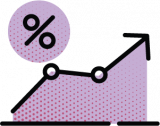Pension for partner and child
Information for survivors
If your partner has passed away, there are many things you need to arrange. Your income or pension situation is also suddenly different. Your partner was a member of the Philips Pensioenfonds.
Our pension scheme provides an income for the partner left behind: the survivor's pension. Any children may be entitled to an orphan's pension. On this page, you can read about what is arranged for you.
E-brochure
| Attachment | Size |
|---|---|
|
15 December 2025
Want to know more? You can read all about survivor and orphan pensions in the e-brochure. |
3.04 MB |
Pension income for you as a survivor
If your partner dies, you will receive a survivor pension from Philips Pensioenfonds. You are entitled to a survivor pension from the month of your partner's death. You will receive this survivor pension as long as you live. Has your partner exchanged the entire survivor pension for more retirement pension? Then you are not entitled to a survivor's pension.
Please note! If your partner received a monthly pension from Philips Pensioenfonds, this will lapse from the month after your partner's death. There may have been pension payments made after that. If this is the case, we will offset the amount overpaid against your survivor's pension.
Action required
Are you living together unmarried? It is important that your partner's details are correct. Only then will we pay a survivor's pension after your death.
Form partner registrationSurrender survivor's pension or orphan's pension?
Your survivor's pension with Philips Pensioenfonds may be less than € 632.63 gross per year. That is the so-called legal surrender limit (2026). If your pension is less than that amount, we may surrender your pension. You will then receive the value as a lump sum (the surrender value). This may also apply to the orphan's pension for your child. After this commutation, you will no longer be entitled to a survivor's pension from Philips Pensioenfonds.
Income from the General Surviving Relatives Act (ANW)
There are a number of conditions you must meet to be eligible for an Anw benefit. In any case, the condition is that your AOW has not yet started and your partner lived or worked in the Netherlands. In addition, at least one of the two following situations must apply:
- you are pregnant or have a child younger than eighteen;
- you have been unfit for work for at least three months for at least 45%.
If you have your own income, that income will be (partially) cut from the Anw benefit. You may even get nothing because your own income is too high. This does not end the right to an Anw benefit. It will remain in force. The amount of the Anw benefit will be recalculated whenever your own income changes.
When does entitlement to Anw benefit end?
When your AOW starts, the Anw benefit will stop. The Anw benefit will also stop if you remarry or start living together. If cohabitation ends again within six months, the Anw benefit will continue as normal. If you do not or no longer meet the conditions, the Anw benefit will stop. This is the case, for example, when your youngest child turns eighteen.
Additional pension income from Anw shortfall insurance
Perhaps your partner had taken out Anw shortfall insurance for you with Philips Pensioenfonds. This insurance is meant to make up for the shortfall or lack of benefit from the Anw. For example, because you do not (or no longer) meet the conditions for an Anw benefit. Has this insurance been taken out? Then you will receive an extra amount each month from this insurance in addition to the survivor's pension until your AOW pension starts.
Pension income for your children
Your children may be entitled to an orphan's pension after your death. The orphan's pension is a temporary pension income for the children. Children also often have major financial consequences after the death of one of the parents. For example, they want to study and are financially dependent on you. You can read more about the conditions for the orphan's pension and what the orphan's pension entails below.
When are your children entitled to an orphan's pension?
Do you have children from your relationship with your (ex-)partner? If so, your children may be eligible for an orphan's pension. This may apply to children under the age of 18, 21 or 27. If your children are older, they will not receive an orphan's pension.The overview below shows which age applies in which situation.
| Children up to 18 year: | If your partner left employment or retired before 1 April 1999. |
|---|---|
| Children up to 21 year: | If your partner was still working at Philips or left employment or retired after 1 April 1999. |
| Children up to 27 year: | If your partner left service or retired before 1 April 1999 and your child is studying. |
How much is the orphan's pension?
The orphan's pension is a temporary pension. Its amount depends on your partner's pension scheme. The orphan's pension stops at the child's age 18, 21 or 27. This depends on the situation as shown in the table above. We will inform your child about the exact amount of the orphan's pension.
Are there several children?
If there are several children, all children (from all relationships) get an orphan's pension.
Communicate details of your children
You live in the Netherlands
If you live in the Netherlands, we automatically receive your children's details from your municipality. You do not have to do anything yourself.
You live abroad
If you live abroad, we will send you the 'Declaration of children' form. On it, you fill in the details of the children who may be eligible for the orphan's pension. We will then check the details. Your child will then be informed about the orphan's pension.
What else you need to know about your pension
Before we can pay your survivor's pension, we need to know a few things from you: your bank details and whether we have to apply wage tax credits. Once we have these details, we can pay your survivor's pension.
Action required
You can enter or change your bank account number in MijnPPF under Profile.
Go to MijnPPFThe payment of your survivor's pension
Click here for an overview of the payment dates for your survivor’s pension. The day and time your pension is credited to your account may vary depending on your bank. For administrative reasons, the first payment may take several months. You will then simultaneously receive the survivor's pension to which you were entitled in the previous months.
Your pension statement
Just before your first pension payment, you will receive the pension specification. This shows your gross and net pension. You receive a specification every month in MijnPPF. You will only be notified of the specification if your net pension payment differs from your pension from the previous month.
What will be deducted from your pension income?
Philips Pensioenfonds deducts a number of amounts from your pension. This is what we deduct:
- Payroll tax;
- income-related Healthcare Insurance Act contribution;
- Philips Pensioners' Association contribution (if you opt for this).
Payroll tax
Payroll tax is deducted from your survivor's pension. Payroll tax consists of wage tax and national insurance contributions. Have you reached your AOW pension age? Then you pay less payroll tax. The higher your pension, the more payroll tax you pay. Take a look at the current rates of payroll tax.
Payroll tax credit
You may also apply wage tax credits to your survivor's pension. Payroll tax is calculated on your entire pension. The loonheffingskorting is deducted from that amount. What remains is the payroll tax you have to pay. Check the current level of the payroll tax credit.
Form 'Loonheffingskorting'
Do you want us to apply the wage tax credit? Then please let us know via MijnPPF under Profile.
MijnPPFIncome-linked contributions under the Dutch Healthcare Insurance Act
The income-related Healthcare Insurance Act contribution (Zvw) is deducted from your pension. We deduct the Zvw contribution from your pension each month. View the current percentage we deduct.
After-tax income tax
From your state pension age, you will receive an AOW pension from the Social Insurance Bank (SVB). In addition, you may have your own (pension) income, an Anw-gap benefit and, of course, the survivor pension from Philips Pension Fund. You pay tax separately on all these incomes. When filing your income tax return, the tax authorities add the incomes together, as a result of which part of your income may be subject to a higher tax rate. If this is the case, you will receive an additional income tax assessment from the Tax Administration. It is wise to take this into account.
Philips Pensioners Association
Would you like to join one of the associations for Philips pensioners? Then you can have your contribution to this association deducted from your pension. You indicate this when you register with the association. An overview of all associations and contact details can be found at www.federatie.nl.
What happens to your survivor's pension in the future?
Your survivor's pension from Philips Pensioenfonds will be given to you for as long as you live. That's why you receive information about this pension every year. In addition, we try to increase your pension every year to maintain its purchasing power as much as possible.
Your annual statement
You need the tax annual statement for your tax return. You receive the annual statement in mid-January each year. The annual statement shows the pension you received in the previous year.
Your pension overview
You will receive the pension overview once a year. The pension statement shows what your pension will be for the coming year. The pension overview also provides information on any increase in your pension.
Increasing your pension
Every year, we try to raise your pension to reflect rising prices. This is our ambition, as described in our indexation policy. However, this indexation is not an automatic given. Every year, the Board of Trustees decides whether your pension can be increased, and if so by how much. Whether or not we can realise our ambition depends on what the law permits, based on our financial health. Another factor is that we want to be in a solid financial position on 1 January 2027 when we switch to the new pension system. The indexation needs to be prudent with that in mind too.
Related information
Is the information below perhaps also interesting for you?

Indexation policy
We try to increase your pension each year with wage inflation. This is called 'indexation'. Do you want to know more about this?
Go to indexation policy
Mijnpensioenoverzicht.nl
You can view your total pension situation on Mijnpensioenoverzicht.nl (in Dutch). There you will also see the pension that you may have accrued with other employers.
Go to Mijnpensioenoverzicht.nl
Financial position
The financial position of Philips Pensioenfonds is assessed on the basis of the funding ratio, among other things.
Go to financial position